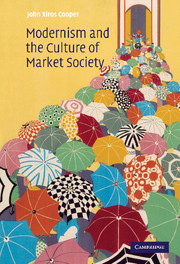Book contents
- Frontmatter
- Contents
- Acknowledgements
- Introduction The modernist avant-garde and the culture of market society
- PART I THE POSTHUMAN SCENE
- PART II THE REGIME OF UNREST: FOUR PRECURSORS
- PART III THE MARGIN IS THE MAINSTREAM
- 9 Artisanal production, Ulysses, and the circulation of goods
- 10 History and the postpsychological self in The Waste Land
- 11 La bohème: Lewis, Stein, Barnes
- 12 Bloomsbury nation
- Notes
- Bibliography
- Index
12 - Bloomsbury nation
Published online by Cambridge University Press: 22 September 2009
- Frontmatter
- Contents
- Acknowledgements
- Introduction The modernist avant-garde and the culture of market society
- PART I THE POSTHUMAN SCENE
- PART II THE REGIME OF UNREST: FOUR PRECURSORS
- PART III THE MARGIN IS THE MAINSTREAM
- 9 Artisanal production, Ulysses, and the circulation of goods
- 10 History and the postpsychological self in The Waste Land
- 11 La bohème: Lewis, Stein, Barnes
- 12 Bloomsbury nation
- Notes
- Bibliography
- Index
Summary
Of all the avant-garde groups on the English scene in the early twentieth century, the Bloomsbury Group seems, at first glance, to be anomalous. Bloomsbury has many of the same internal features as other bohemias, yet its peculiar position in English society leaves it less socially marginal or cut off than other groups. Its principal members and associates enjoyed closer ties with the social and political elites in London. This contrasts with the social divide that separates avant-garde groups in continental Europe from the native upper classes. Their more distinct separation is probably best explained by the greater degree of active political radicalism of continental avant-gardes as opposed to their English counterparts.
In London, avant-garde groups that numbered foreigners, young men and women from the provinces, and the sons and daughters of recent migrants to England – as in the case of writers and painters from the Jewish community in Whitechapel – did not enjoy Bloomsbury's relatively easy and continuous access to the elites. Mark Gertler's personal difficulties leading to his suicide in 1939 cannot be put down entirely to the class system, but his origins, his “foreignness” as a poor Jew in what was still an insular and anti-Semitic society did not help. His unremitting poverty, his egotism, his social gaffes, and his clinical depression, as Sarah MacDougall has shown, were mainly to blame for his situation.
- Type
- Chapter
- Information
- Modernism and the Culture of Market Society , pp. 243 - 255Publisher: Cambridge University PressPrint publication year: 2004



